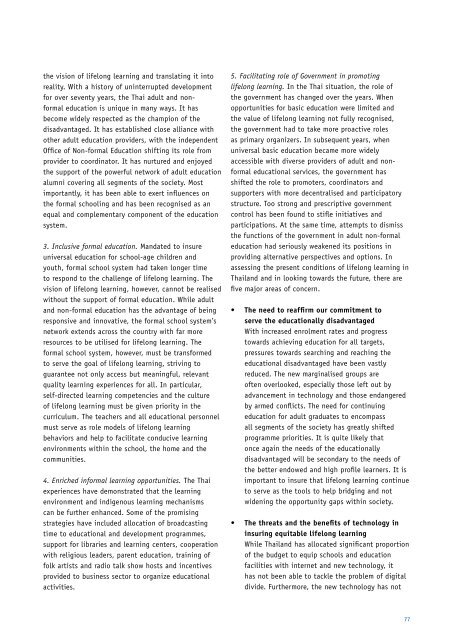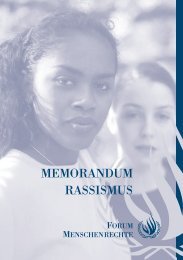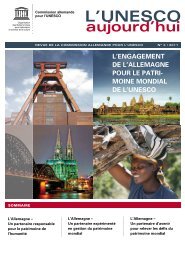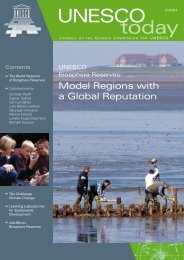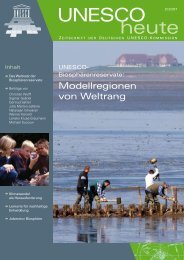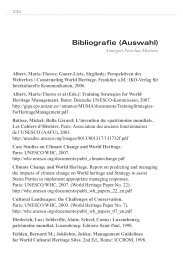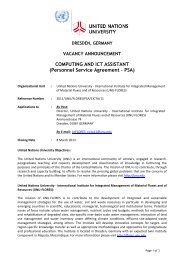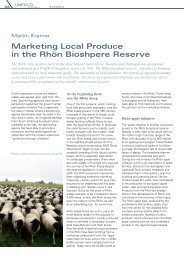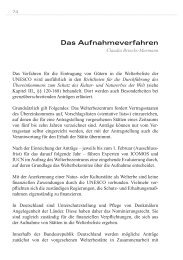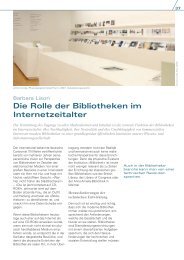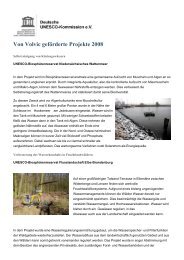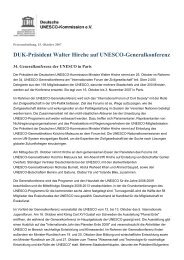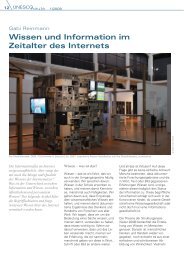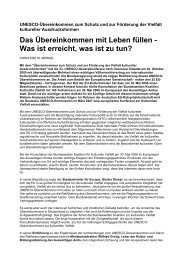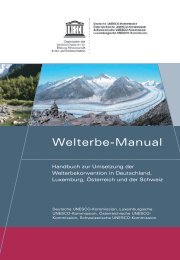CONFINTEA VI, final report - Unesco
CONFINTEA VI, final report - Unesco
CONFINTEA VI, final report - Unesco
You also want an ePaper? Increase the reach of your titles
YUMPU automatically turns print PDFs into web optimized ePapers that Google loves.
the vision of lifelong learning and translating it into<br />
reality. With a history of uninterrupted development<br />
for over seventy years, the Thai adult and nonformal<br />
education is unique in many ways. It has<br />
become widely respected as the champion of the<br />
disadvantaged. It has established close alliance with<br />
other adult education providers, with the independent<br />
Office of Non-formal Education shifting its role from<br />
provider to coordinator. It has nurtured and enjoyed<br />
the support of the powerful network of adult education<br />
alumni covering all segments of the society. Most<br />
importantly, it has been able to exert influences on<br />
the formal schooling and has been recognised as an<br />
equal and complementary component of the education<br />
system.<br />
3. Inclusive formal education. Mandated to insure<br />
universal education for school-age children and<br />
youth, formal school system had taken longer time<br />
to respond to the challenge of lifelong learning. The<br />
vision of lifelong learning, however, cannot be realised<br />
without the support of formal education. While adult<br />
and non-formal education has the advantage of being<br />
responsive and innovative, the formal school system’s<br />
network extends across the country with far more<br />
resources to be utilised for lifelong learning. The<br />
formal school system, however, must be transformed<br />
to serve the goal of lifelong learning, striving to<br />
guarantee not only access but meaningful, relevant<br />
quality learning experiences for all. In particular,<br />
self-directed learning competencies and the culture<br />
of lifelong learning must be given priority in the<br />
curriculum. The teachers and all educational personnel<br />
must serve as role models of lifelong learning<br />
behaviors and help to facilitate conducive learning<br />
environments within the school, the home and the<br />
communities.<br />
4. Enriched informal learning opportunities. The Thai<br />
experiences have demonstrated that the learning<br />
environment and indigenous learning mechanisms<br />
can be further enhanced. Some of the promising<br />
strategies have included allocation of broadcasting<br />
time to educational and development programmes,<br />
support for libraries and learning centers, cooperation<br />
with religious leaders, parent education, training of<br />
folk artists and radio talk show hosts and incentives<br />
provided to business sector to organize educational<br />
activities.<br />
5. Facilitating role of Government in promoting<br />
lifelong learning. In the Thai situation, the role of<br />
the government has changed over the years. When<br />
opportunities for basic education were limited and<br />
the value of lifelong learning not fully recognised,<br />
the government had to take more proactive roles<br />
as primary organizers. In subsequent years, when<br />
universal basic education became more widely<br />
accessible with diverse providers of adult and nonformal<br />
educational services, the government has<br />
shifted the role to promoters, coordinators and<br />
supporters with more decentralised and participatory<br />
structure. Too strong and prescriptive government<br />
control has been found to stifle initiatives and<br />
participations. At the same time, attempts to dismiss<br />
the functions of the government in adult non-formal<br />
education had seriously weakened its positions in<br />
providing alternative perspectives and options. In<br />
assessing the present conditions of lifelong learning in<br />
Thailand and in looking towards the future, there are<br />
five major areas of concern.<br />
• The need to reaffirm our commitment to<br />
serve the educationally disadvantaged<br />
With increased enrolment rates and progress<br />
towards achieving education for all targets,<br />
pressures towards searching and reaching the<br />
educational disadvantaged have been vastly<br />
reduced. The new marginalised groups are<br />
often overlooked, especially those left out by<br />
advancement in technology and those endangered<br />
by armed conflicts. The need for continuing<br />
education for adult graduates to encompass<br />
all segments of the society has greatly shifted<br />
programme priorities. It is quite likely that<br />
once again the needs of the educationally<br />
disadvantaged will be secondary to the needs of<br />
the better endowed and high profile learners. It is<br />
important to insure that lifelong learning continue<br />
to serve as the tools to help bridging and not<br />
widening the opportunity gaps within society.<br />
• The threats and the benefits of technology in<br />
insuring equitable lifelong learning<br />
While Thailand has allocated significant proportion<br />
of the budget to equip schools and education<br />
facilities with internet and new technology, it<br />
has not been able to tackle the problem of digital<br />
divide. Furthermore, the new technology has not<br />
77


